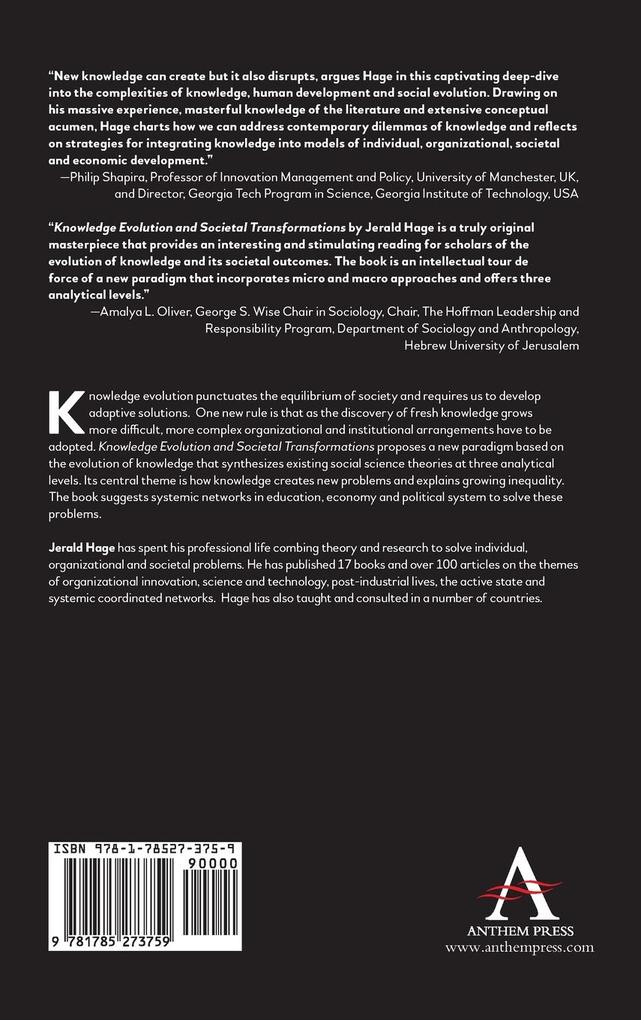
Zustellung: Do, 28.08. - Mo, 01.09.
Versand in 7 Tagen
VersandkostenfreiBestellen & in Filiale abholen:
Knowledge Evolution and Societal Transformation proposes a new paradigm based on the evolution of knowledge that synthesizes existing social science theories at three analytical levels. A central theme is how knowledge causes new problems and explains growing inequality. To solve these problems, systemic networks in education, economy, and political system are suggested.
Inhaltsverzeichnis
List of Illustrations; Foreword: A Magnum Opus for Our Times and the Future by Michael Quinn Patton; Odyssey: Social Capital Acknowledgements in the Intellectual Journey through the Micro, Macro and Meso Worlds of Reality; Chapter One Everything You Ever Wanted to Know about Knowledge: Punctuated Equilibrium Theory, Knowledge Creators, Structural Change, Adaptive Problems, and Institutional Solutions; Part One Knowledge Creators or Problem Solvers: Creative Minds, Radical Organizational Innovations, and Regional Environments That Encourage Higher Radical Innovation Rates; Chapter Two Knowledge Creators: Individual Creativity; Chapter Three Knowledge Creators: Radical Organizational Innovation; Chapter Four Knowledge Creators: Institutional Environments That Encourage Radical Innovation; Part Two Structural Change: Structural Diff erentiation and Dediff erentiation in Occupations and Their Classes, Organizations and Their Contexts, Networks and Their Cohesions; Chapter Five Structural Changes in the Stratifi cation System: New Occupations and Kinds of Social Classes; Chapter Six Structural Change in the Organization- Context Nexus: New Organizational Forms and Collaborative Competition; Chapter Seven Structural Change in Network Cohesion Links: New Coordinated Network Systems and Collaborative Social Cohesion; Part Three Adaptive Problems and Institutional Transformations Required to Create Meaningful Work, Employment, and Social Integration; Chapter Eight Knowledge Evolution and Adaptive Problems of the Skill Formation/ Research Capability System: Institutional Transformations That Produce New Skills and Reduce Alienation; Chapter Nine Knowledge Evolution and Adaptive Problems of the Economic System: Institutional Transformations to Create Decision- Making Jobs and Reduce Powerlessness; Chapter Ten Knowledge Evolution and Adaptive Problems of the Political System: Institutional Transformations to Create Safety Nets for the Socially Isolated/Mentally Ill and Constructing a New Democracy; Chapter Eleven Everything We Must Do to Further Social Evolution and Institutional Transformations: Solutions, Strategies, and the Stickiness of Path Dependencies; A Future Voyage: The Fourth Stage of Knowledge Creation; References; Index.
Produktdetails
Erscheinungsdatum
30. April 2020
Sprache
englisch
Untertitel
Action Theory to Solve Adaptive Problems.
Sprache: Englisch.
Seitenanzahl
418
Autor/Autorin
Jerald Hage
Verlag/Hersteller
Produktart
gebunden
Gewicht
826 g
Größe (L/B/H)
235/157/29 mm
ISBN
9781785273759
Entdecken Sie mehr
Bewertungen
0 Bewertungen
Es wurden noch keine Bewertungen abgegeben. Schreiben Sie die erste Bewertung zu "Knowledge Evolution and Societal Transformations" und helfen Sie damit anderen bei der Kaufentscheidung.











